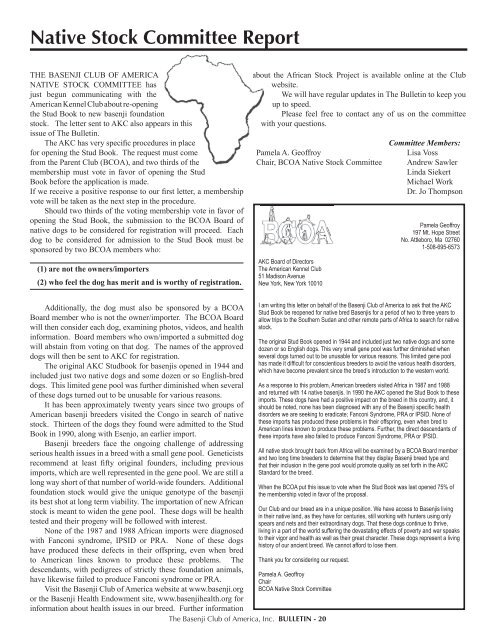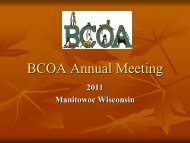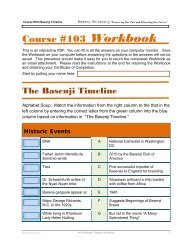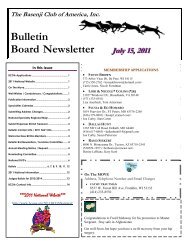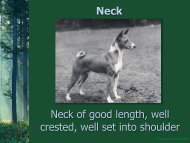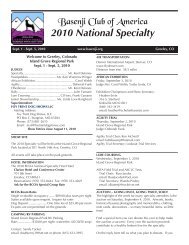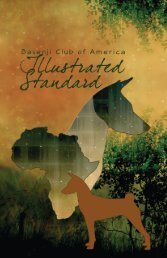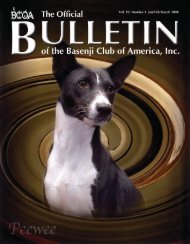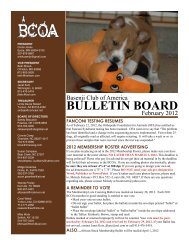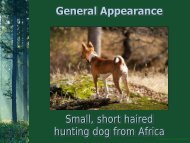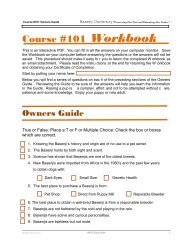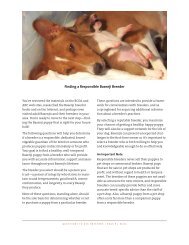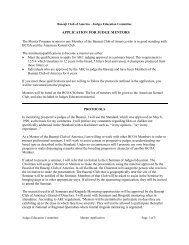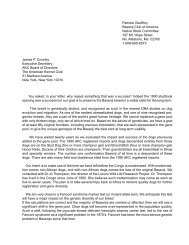BCOA Bulletin January-February-March 2007 - the Basenji Club of ...
BCOA Bulletin January-February-March 2007 - the Basenji Club of ...
BCOA Bulletin January-February-March 2007 - the Basenji Club of ...
Create successful ePaper yourself
Turn your PDF publications into a flip-book with our unique Google optimized e-Paper software.
Native Stock Committee Report<br />
THE BASENJI CLUB OF AMERICA<br />
NATIVE STOCK COMMITTEE has<br />
just begun communicating with <strong>the</strong><br />
American Kennel <strong>Club</strong> about re-opening<br />
<strong>the</strong> Stud Book to new basenji foundation<br />
stock. The letter sent to AKC also appears in this<br />
issue <strong>of</strong> The <strong>Bulletin</strong>.<br />
The AKC has very specifi c procedures in place<br />
for opening <strong>the</strong> Stud Book. The request must come<br />
from <strong>the</strong> Parent <strong>Club</strong> (<strong>BCOA</strong>), and two thirds <strong>of</strong> <strong>the</strong><br />
membership must vote in favor <strong>of</strong> opening <strong>the</strong> Stud<br />
Book before <strong>the</strong> application is made.<br />
If we receive a positive response to our fi rst letter, a membership<br />
vote will be taken as <strong>the</strong> next step in <strong>the</strong> procedure.<br />
Should two thirds <strong>of</strong> <strong>the</strong> voting membership vote in favor <strong>of</strong><br />
opening <strong>the</strong> Stud Book, <strong>the</strong> submission to <strong>the</strong> <strong>BCOA</strong> Board <strong>of</strong><br />
native dogs to be considered for registration will proceed. Each<br />
dog to be considered for admission to <strong>the</strong> Stud Book must be<br />
sponsored by two <strong>BCOA</strong> members who:<br />
(1) are not <strong>the</strong> owners/importers<br />
(2) who feel <strong>the</strong> dog has merit and is worthy <strong>of</strong> registration.<br />
about <strong>the</strong> African Stock Project is available online at <strong>the</strong> <strong>Club</strong><br />
website.<br />
We will have regular updates in The <strong>Bulletin</strong> to keep you<br />
up to speed.<br />
Please feel free to contact any <strong>of</strong> us on <strong>the</strong> committee<br />
with your questions.<br />
Pamela A. Ge<strong>of</strong>froy<br />
Chair, <strong>BCOA</strong> Native Stock Committee<br />
AKC Board <strong>of</strong> Directors<br />
The American Kennel <strong>Club</strong><br />
51 Madison Avenue<br />
New York, New York 10010<br />
Committee Members:<br />
Lisa Voss<br />
Andrew Sawler<br />
Linda Siekert<br />
Michael Work<br />
Dr. Jo Thompson<br />
Pamela Ge<strong>of</strong>froy<br />
197 Mt. Hope Street<br />
No. Attleboro, Ma 02760<br />
1-508-695-6573<br />
Additionally, <strong>the</strong> dog must also be sponsored by a <strong>BCOA</strong><br />
Board member who is not <strong>the</strong> owner/importer. The <strong>BCOA</strong> Board<br />
will <strong>the</strong>n consider each dog, examining photos, videos, and health<br />
I am writing this letter on behalf <strong>of</strong> <strong>the</strong> <strong>Basenji</strong> <strong>Club</strong> <strong>of</strong> America to ask that <strong>the</strong> AKC<br />
Stud Book be reopened for native bred <strong>Basenji</strong>s for a period <strong>of</strong> two to three years to<br />
allow trips to <strong>the</strong> Sou<strong>the</strong>rn Sudan and o<strong>the</strong>r remote parts <strong>of</strong> Africa to search for native<br />
stock.<br />
information. Board members who own/imported a submitted dog<br />
will abstain from voting on that dog. The names <strong>of</strong> <strong>the</strong> approved<br />
dogs will <strong>the</strong>n be sent to AKC for registration.<br />
The original Stud Book opened in 1944 and included just two native dogs and some<br />
dozen or so English dogs. This very small gene pool was fur<strong>the</strong>r diminished when<br />
several dogs turned out to be unusable for various reasons. This limited gene pool<br />
The original AKC Studbook for basenjis opened in 1944 and<br />
included just two native dogs and some dozen or so English-bred<br />
has made it diffi cult for conscientious breeders to avoid <strong>the</strong> various health disorders,<br />
which have become prevalent since <strong>the</strong> breed’s introduction to <strong>the</strong> western world.<br />
dogs. This limited gene pool was fur<strong>the</strong>r diminished when several As a response to this problem, American breeders visited Africa in 1987 and 1988<br />
<strong>of</strong> <strong>the</strong>se dogs turned out to be unusable for various reasons.<br />
It has been approximately twenty years since two groups <strong>of</strong><br />
American basenji breeders visited <strong>the</strong> Congo in search <strong>of</strong> native<br />
and returned with 14 native basenjis. In 1990 <strong>the</strong> AKC opened <strong>the</strong> Stud Book to <strong>the</strong>se<br />
imports. These dogs have had a positive impact on <strong>the</strong> breed in this country, and, it<br />
should be noted, none has been diagnosed with any <strong>of</strong> <strong>the</strong> <strong>Basenji</strong> specifi c health<br />
disorders we are seeking to eradicate; Fanconi Syndrome, PRA or IPSID. None <strong>of</strong><br />
stock. Thirteen <strong>of</strong> <strong>the</strong> dogs <strong>the</strong>y found were admitted to <strong>the</strong> Stud<br />
Book in 1990, along with Esenjo, an earlier import.<br />
<strong>Basenji</strong> breeders face <strong>the</strong> ongoing challenge <strong>of</strong> addressing<br />
<strong>the</strong>se imports has produced <strong>the</strong>se problems in <strong>the</strong>ir <strong>of</strong>fspring, even when bred to<br />
American lines known to produce <strong>the</strong>se problems. Fur<strong>the</strong>r, <strong>the</strong> direct descendants <strong>of</strong><br />
<strong>the</strong>se imports have also failed to produce Fanconi Syndrome, PRA or IPSID.<br />
serious health issues in a breed with a small gene pool. Geneticists<br />
recommend at least fi fty original founders, including previous<br />
imports, which are well represented in <strong>the</strong> gene pool. We are still a<br />
All native stock brought back from Africa will be examined by a <strong>BCOA</strong> Board member<br />
and two long time breeders to determine that <strong>the</strong>y display <strong>Basenji</strong> breed type and<br />
that <strong>the</strong>ir inclusion in <strong>the</strong> gene pool would promote quality as set forth in <strong>the</strong> AKC<br />
Standard for <strong>the</strong> breed.<br />
long way short <strong>of</strong> that number <strong>of</strong> world-wide founders. Additional<br />
foundation stock would give <strong>the</strong> unique genotype <strong>of</strong> <strong>the</strong> basenji<br />
its best shot at long term viability. The importation <strong>of</strong> new African<br />
When <strong>the</strong> <strong>BCOA</strong> put this issue to vote when <strong>the</strong> Stud Book was last opened 75% <strong>of</strong><br />
<strong>the</strong> membership voted in favor <strong>of</strong> <strong>the</strong> proposal.<br />
stock is meant to widen <strong>the</strong> gene pool. These dogs will be health<br />
tested and <strong>the</strong>ir progeny will be followed with interest.<br />
None <strong>of</strong> <strong>the</strong> 1987 and 1988 African imports were diagnosed<br />
Our <strong>Club</strong> and our breed are in a unique position. We have access to <strong>Basenji</strong>s living<br />
in <strong>the</strong>ir native land, as <strong>the</strong>y have for centuries, still working with hunters using only<br />
spears and nets and <strong>the</strong>ir extraordinary dogs. That <strong>the</strong>se dogs continue to thrive,<br />
living in a part <strong>of</strong> <strong>the</strong> world suffering <strong>the</strong> devastating effects <strong>of</strong> poverty and war speaks<br />
with Fanconi syndrome, IPSID or PRA. None <strong>of</strong> <strong>the</strong>se dogs<br />
have produced <strong>the</strong>se defects in <strong>the</strong>ir <strong>of</strong>fspring, even when bred<br />
to <strong>the</strong>ir vigor and health as well as <strong>the</strong>ir great character. These dogs represent a living<br />
history <strong>of</strong> our ancient breed. We cannot afford to lose <strong>the</strong>m.<br />
to American lines known to produce <strong>the</strong>se problems. The Thank you for considering our request.<br />
descendants, with pedigrees <strong>of</strong> strictly <strong>the</strong>se foundation animals,<br />
have likewise failed to produce Fanconi syndrome or PRA.<br />
Visit <strong>the</strong> <strong>Basenji</strong> <strong>Club</strong> <strong>of</strong> America website at www.basenji.org<br />
or <strong>the</strong> <strong>Basenji</strong> Health Endowment site, www.basenjihealth.org for<br />
information about health issues in our breed. Fur<strong>the</strong>r information<br />
Pamela A. Ge<strong>of</strong>froy<br />
Chair<br />
<strong>BCOA</strong> Native Stock Committee<br />
The <strong>Basenji</strong> <strong>Club</strong> <strong>of</strong> America, Inc. BULLETIN - 20


